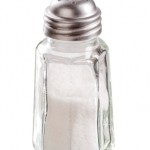Finished with shoveling snow for the second time in twenty-four hours, I sat down to eat hot oatmeal with pumpkin, a treat Lynnette dreamed up recently. In her mail stack I noted a copy of Prevention, a magazine I seldom read, but this particular issue had a story with an intriguing title "The Food Addiction That's Making you Fat,"
After reading the article, which I regraded as strong on suggestions, but light on references, I went back to the medical literature trying to discover if the basic premise, that salt can cause a spike in the level of dopamine, a chemical that stimulates our brain's "pleasure center" made medical sense. It took a while, but I found a 2008 article on PubMed Central (part of the National Library of Medicine's website that offer access to abstracts and full-text articles), and discovered the background data for the statement.
In 2008, in the journal Physiology and Behavior, a University of Iowa group published an article titled "Salt Craving: The Psychobiology of pathogenic sodium intake." I won't bore you with the details, but the 46-page article was well=written and the data seemed sound.
The abstract mentioned that salt is essential to our physiological functions and generally is regarded as "highly palatable." Other sources say it brings out flavor in many foods and a humorous Time Magazine article on that subject that I found (Josh Ozersky May 17, 2010) said a New York legislator had recently proposed banning all salt use in restaurant kitchens, making the author think of fleeing to Canada. He called salt "cocaine for the palate."
That made me delve into the body of the much longer article. The data and studies quoted did point to the dopaminergic mechanism being involved in salt depletion experiments. But that's salt depletion and our typical diet is a long ways from leading to that state.
I think the bottom line is salt enhances taste and we get conditioned to expect it as a learned behavior. Newborns either dislike salt or don't care; we're two or three before the baby-food industry or our parents get us hooked on salt.
But hooked most of us are; that's the bad news. The good news is that addiction can be broken, starting with removing salt shakers form your dining area and coking without salt. We now use many other spices, not spice mixes which may have salt as a major ingredient...and get by just fine.
The bottom line is that many things can be regarded as addictive: drugs of course, but also fats, chocolate, carbs, sex and voluntary exercise. And with that note, I think it's time to go to the gym. Now there's an addiction I enjoy.


From a totally non-medical perspective, I would have to agree that salt can be addicting. I love salty chips and popcorn. I have, though, tried to cut down on the salt I use when I cook. Like you said, there are many other spice options to use instead of salt. I noticed a slight difference in the taste when I started to reduce the salt content, but over the last couple of months I have pretty much cut it out completely from my cooking and I don't notice a difference anymore.
We don't use table salt at all and rarely cook with it (occasionally for larger group diners, but even then we use much less than the recipe stipulates). We have a pepper grinder in the dining room and on our breakfast-area table. We always check labels and pick lower-salt choices. When we needed ketchup for our bison meatloaf last night (dinner for neighbors), we found a no-salt ketchup at our usual grocery store.